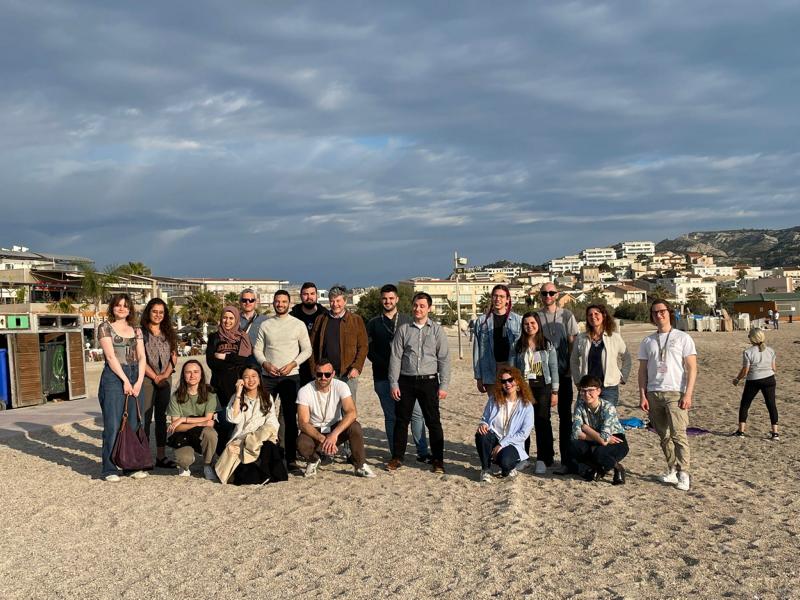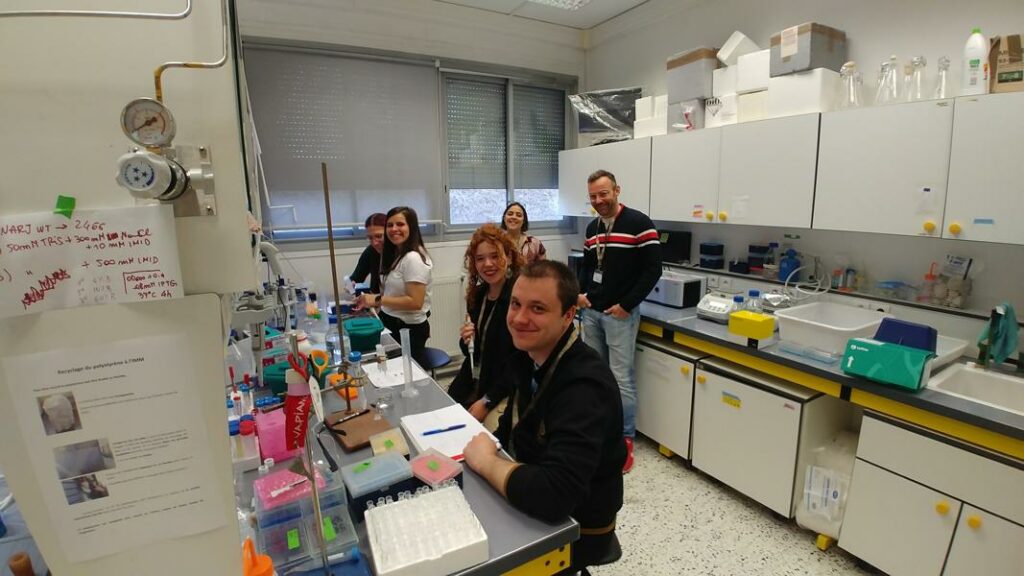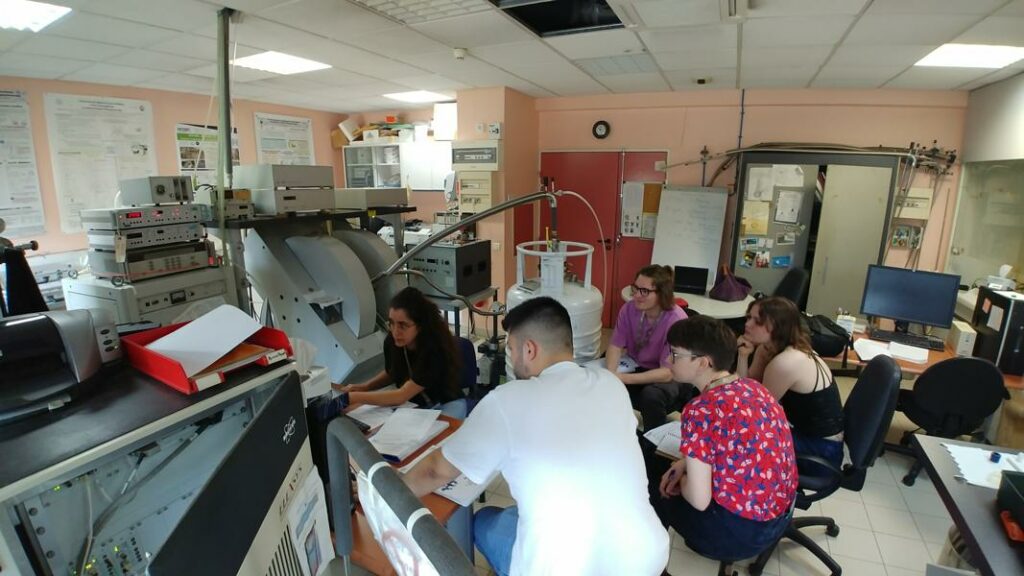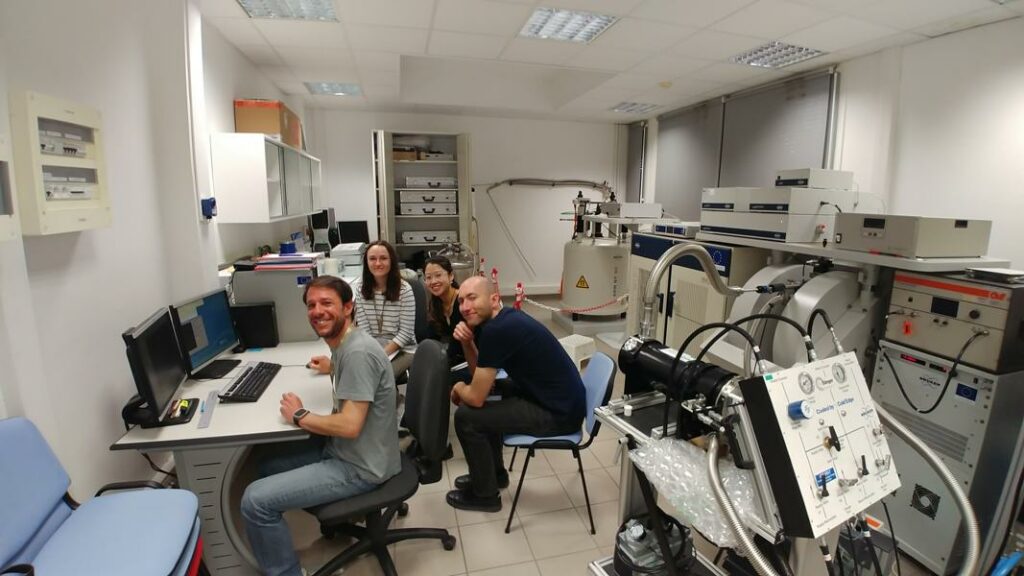ESC6: EPR spectroscopy: metal centers and radicals for the study of proteins
Dates: 15th-17th May 2023
Location: Marseille, France (EPR-MRS)
Full address: Laboratoire BIP, 31 chemin Joseph Aiguier, 13009 Marseille
Number of participants: 10
It is no longer possible to apply for this course.

Description of the course:
EPR spectroscopy is the technique of choice to study paramagnetic species in proteins. These paramagnetic species can be either endogenous (such as metals cofactors or radicals) or grafted to the protein of interest. This spectroscopy offers a wide range of applications including studies of enzyme mechanism, electron transfers, protein dynamics, structural transitions, and protein-protein interactions.
This short practical course is dedicated to beginners in EPR spectroscopy. It focuses on the use of different EPR spectrometers: from the classical ones (continuous wave, cw-EPR) to the most advanced ones (pulsed EPR, ENDOR, ELDOR). During the course we will give lectures on the first half day to introduce the basics of EPR and the most common applications in the field of molecular biophysics. Then each attendee will perform 3 different hands-on measurements in small groups (3 to 4 students). Best practices for EPR measurements including instrumental calibration, choice of the optimal parameters, high quality EPR spectra recording, and quantification will be reviewed. Some details about the analysis of EPR spectra will also be given.
Outline of the course:
The course will start midday on Monday the 15th and end midday Thursday the 17th of May.
Lunch including round table introduction of participants and hosts.
Afternoon of Day 1:
Lecture 1: Introduction to EPR spectroscopy: basic principles
Lecture 2: Applications of EPR spectroscopy to the study of metalloproteins
Lecture 3: Applications of EPR spectroscopy to the study of protein dynamics
Tour of the Mediterranean Institute of Microbiology (IMM) facilities (EPR, NMR, proteomics and fermentation platform)
Dinner in Marseille in the beach area
Practical sessions: Day 2 – Morning of Day 3:
Three groups will be formed for hands-on in teams of 3-4 participants.
The duration of each practical course will be 3 to 4 hours, so that Day 2 and 3 will be entirely devoted to the experimental part. A rotation between groups and practical courses will be organized.
Practical 1: Continuous-wave EPR spectroscopy at room temperature
Site-directed spin labelling and applications to protein dynamics studies
Practical 2: Continuous-wave EPR spectroscopy under cryogenic conditions
EPR spectra of different metalloproteins, identification of metal cofactors, illustration of the effect of the temperature
Practical 3: Introduction to pulsed EPR spectroscopy
Site-directed spin labelling and applications to protein dynamics studies
Evening of Day 2: Pizza party with the JSM3* team at the Mediterranean Institute of Microbiology
Midday of Day 3: Lunch, feedback and goodbye.
*JSM3 is the Junior Scientists Microbiology Meeting of Marseille
Other details:
Participants will receive financial support to attend the course, including a contribution to their travel, lunches, dinners, and 2 nights of accommodation with breakfast (accommodation will be booked by the organizers). Successful applicants will be informed of the eligible expenses when they receive a formal acceptance letter.
Download a pdf version of a flyer for this course via the link below:
The MOSBRI End user Short Course, EPR spectroscopy: metal centers and radicals for the study of proteins, was held at Laboratoire BIP, Marseille, France (EPR-MRS), in May 2023.
A MOSBRI course on “EPR spectroscopy: metal centres and radicals for the study of protein” took place in Marseille, 15th – 17th May 2023. Eleven participants from seven countries (Czech Republic, Germany, Hungary, Italy, Portugal, United Kingdom, Spain) attended this 2‐day course at the BIP laboratory (CNRS Aix-Marseille Université UMR7281). The main goal of this course was to explain the basics of EPR spectroscopy and to show the different approaches that can be used to study biomolecules. The programme included lectures during the first afternoon followed by three different EPR practicals performed in small groups for the remaining one and a half day. The attendees discovered the different use of EPR spectroscopy from the classical continuous wave EPR to more advanced pulsed EPR by running experiments both at room and cryogenic temperature. All the members of the EPR-MRS site contributed to make this event as interesting and convivial as possible.
Course material
Lecture – Introduction to EPR Spectroscopy and
Applications in Biology 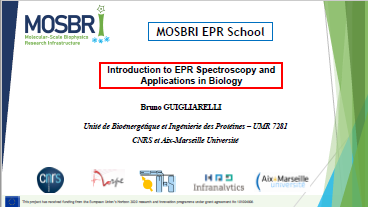
Lecture – Applications of EPR spectroscopy to the study of metalloproteins
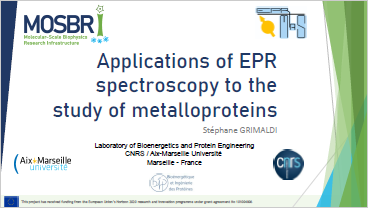
Lecture – Applications of EPR spectroscopy to the study of protein dynamics
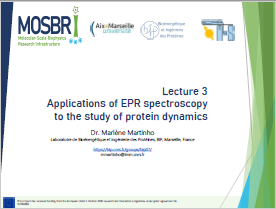
Practical – Continuous-wave EPR spectroscopy at room temperature 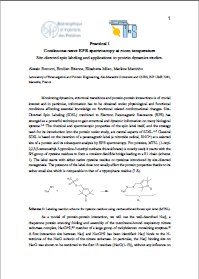
Practical – CW EPR for metal centres at cryogenic temperature
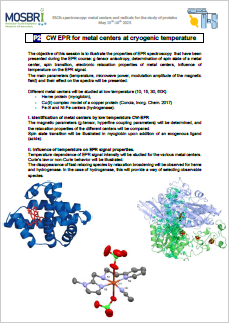
Practical – Introduction to pulsed-EPR
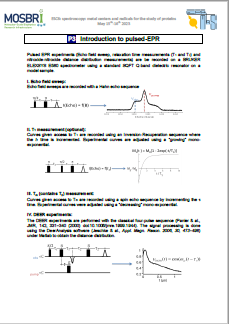
Application to take part in the course
The course is limited to 10 participants and therefore any interested parties will need to submit an application for consideration to take part.
Who is eligible to apply:
Anyone with a workplace/host institution in one of the EU member or associated states may apply to attend this course (this includes people from the UK). Applicants from industry are also welcome. It is expected that the applicant has at least a basic knowledge of molecular biology, chemistry and/or biophysics and that it is applicable to their area of research/work. Applications from scientists in the early-stage of their career are particularly encouraged and we will strive to obtain a gender balance of the participants in the course.
How to apply:
The application consists of:
- submission of a completed course application form which includes:
- motivation for attendance
- a short scientific CV
- if you are a student or postdoc, a reference letter.
Once the application period is closed, all submissions will be reviewed and the applicants will be informed of the outcome.
When to apply:
It is no longer possible to apply for this course. The applications received are under review and applicants will be informed once a decision has been made.
Application deadline:
The deadline for submission of an application to participate in this course was: 17th April 2023.
